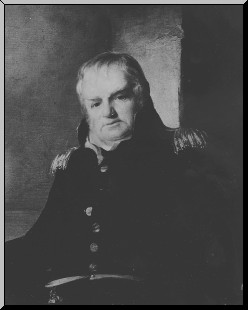
Jonathan Williams, 1751-1851

Picture from http://www.hq.usace.army.mil/history/coe.htm#2
"a station favorable to the pursuits of science, for the foundation of whwich I am more indebted to the habits of intimaccy and daily instructions of your never to be forgotten Father, than to any other source whatever." So wrote Jonathan Williams to Benjamin Franklin's son (there were three, so figure out which one). [Thomas 2002, p. 70, citing Zuersher 1974, p. 82]
During the early years, the Academy was open from March to November, an unusual calendar among American colleges [check this]. This was because of the inadequate housing at West Point as well as Williams's desire "to be in Philadelphia during the height of intellectual activities of the city" [Thomas 2002, p. 66]. What can I learn of his participation there?
By 1808 Jefferson realized there were problems at the Academy and asked Congress to make improvements. See Jefferson to Congress, 18 March 1808, American State Papers: Military Affairs, vol. 1, pp. 228-230. This is available on the web, so get a copy [Thomas 2002, p. 66]. This is a rather interesting document. Is there a draft of this in the Williams papers? Williams wanted to move the Academy to D.C. As he later wrote, "at West Point it is as completely obscure as if it were placed on the north side of the Ohio." [Memorandum by Williams, 15 January 1810, quoted by Thomas 2002, p. 67]. The Academy reform bill, supplemented by Williams's report, passed the Senate, but not the House [Thomas 2002, p. 69].
"With Madison's election to the presidency and his appointment of William Eustis as Secretary of War, Williams, the Academy, and the Corps of Engineers entered a period where they were fighting against army reductions and possible elimination." [Thomas 2002, p. 69]
He had two sons:
Williams resigned from the service at the beginning of the war of 1812 because the Secretary of War, Henry Eustis, refused to give him command of Castle Williams, a fortification he designed and was named after him. He returned to Philadelphia to devote himself to literary and scientific pursuits. He was elected to Congress in 1814, but died the following May at the age of sixty-five [Thomas 2002, p. 85]
Publications:
Archives:
References:
“A Tribute To Our First Superintendent,” Assembly, vol. 18 (Winter 1960), 22 and 24
“First Supe Honored,” Assembly, vol. 21 (Spring 1962), 16.
Williams, Henry Jonathan , A Brief Account of the Family of Jonathan Williams, 1751-1815, 1873.
Zuersher, Dorothy, Benjamin Franklin, Jonathan Williams, and the United States Military Academy, Ph.D. Dissertation, University of North Carolina at Greensboro, 1974.